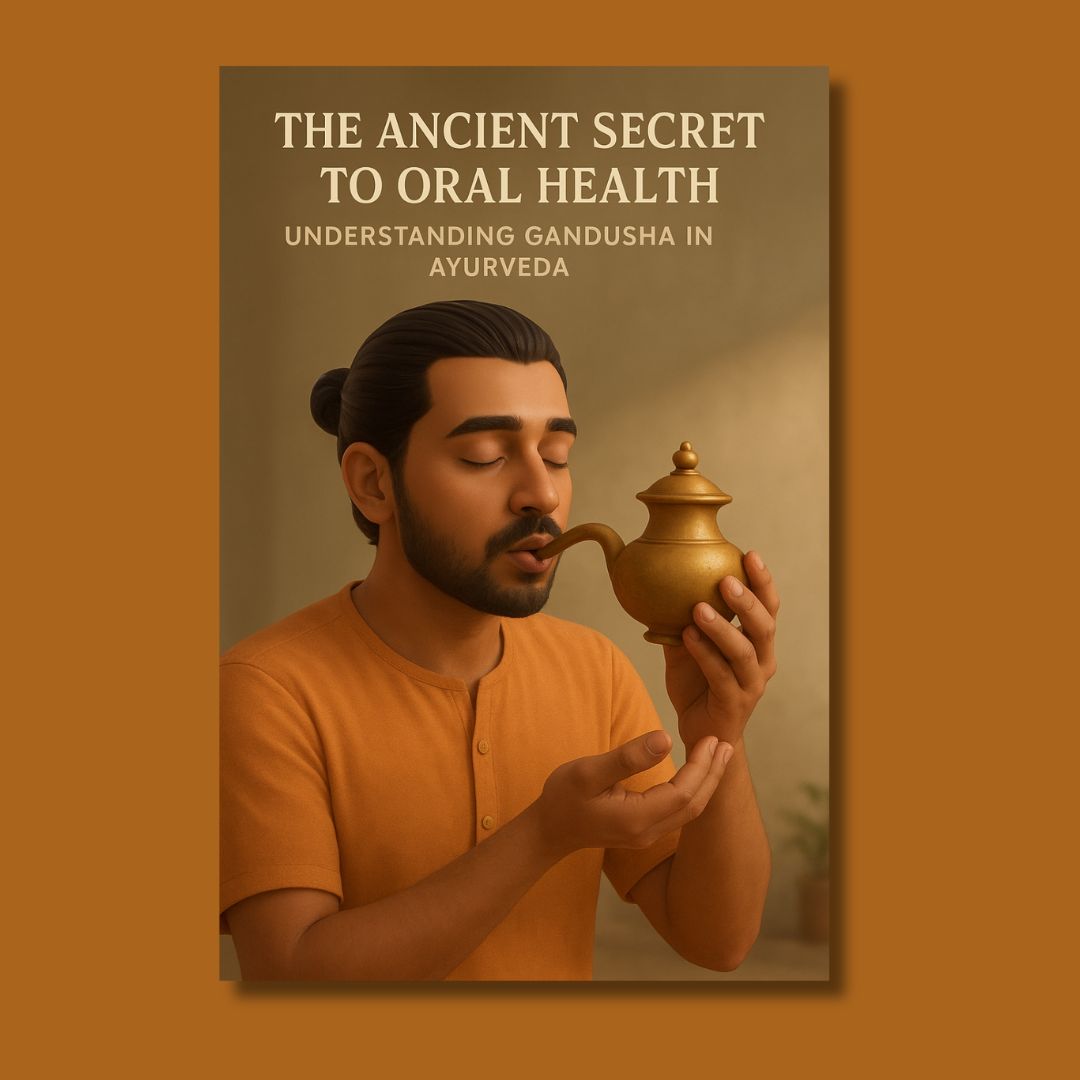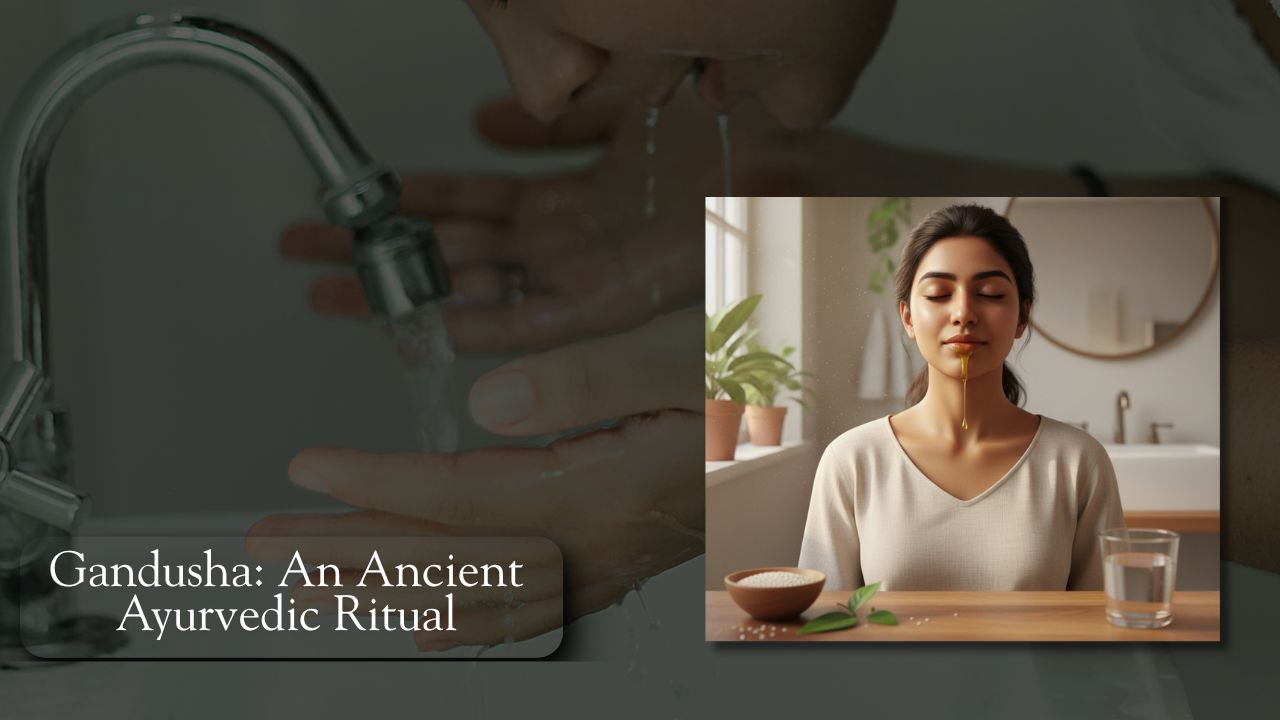The Ancient Secret to Oral Health: Understanding Gandusha in Ayurveda
What is Gandusha (Oil Pulling)?
In the rich tradition of Ayurveda, the ancient Indian system of medicine, Gandusha is a powerful cleansing ritual often referred to in the West as "oil pulling." It is an integral part of Dinacharya (the daily regimen) and involves holding a specific amount of medicated oil, herbal decoction, or other liquid in the mouth for a prescribed duration without swishing or gargling, and then expelling it.
The term Gandusha is sometimes used interchangeably with Kavala, though they have a subtle technical difference:
- Gandusha involves filling the mouth to its maximum capacity with the liquid and retaining it without any movement.
- Kavala (or Kavala Graha) involves holding a smaller quantity of liquid, allowing for active swishing or gargling.
Both practices are aimed at purifying the oral cavity and are believed to draw out toxins (Ama) from the mouth, throat, and head region, thereby promoting overall systemic health.
The Benefits of Incorporating Gandusha
Regular practice of Gandusha is cited in Ayurvedic texts to offer a multitude of benefits, many of which relate directly to oral hygiene and the health of the sensory organs connected to the mouth:
- Improves Oral Health: It helps to strengthen the gums, teeth, and jaw. It is traditionally used to combat issues like bad breath (Halitosis), prevent cavities (Krimidanta), and reduce gum diseases like gingivitis.
- Detoxification: By pulling out impurities and reducing the bacterial load in the oral cavity, it prevents these toxins from entering the digestive system.
- Strengthens Facial Structures: It can help strengthen the facial muscles, jaw, and improve the quality of the voice.
- Relief from Dryness: It is beneficial in preventing dryness of the mouth and throat, and cracking of the lips.
- Enhanced Sensory Perception: It is believed to sharpen the perception of taste.
- Supports Overall Well-being: Some Ayurvedic texts connect the practice to alleviating headaches/migraines and improving digestion by stimulating digestive enzymes.

How to Perform Gandusha
Gandusha is best performed first thing in the morning, on an empty stomach, before or after brushing your teeth.
- Select Your Medium: Choose an appropriate oil based on your needs and Dosha constitution. Commonly used oils include:
- Sesame Oil (Taila): Recommended for its warming, nourishing qualities, especially beneficial for Vata imbalances (dryness, pain).
- Coconut Oil (Narikela Taila): Popular for its cooling properties and antimicrobial action, often preferred for Pitta imbalances (inflammation, burning sensation).
- Medicated Oils or Decoctions: For specific health concerns, an Ayurvedic practitioner may recommend specialized preparations like Irimedadi Taila or a Triphala decoction.
- Preparation: Take approximately 1-2 tablespoons of the chosen liquid. It can be slightly warmed to enhance its effect.
- Retention: Gently pour the oil into your mouth, filling the oral cavity to the point where it becomes difficult to move the liquid. Do not swallow it.
- Duration: Hold the oil in your mouth for the prescribed duration, typically 3 to 5 minutes in its strictest sense, or until the mouth fills with salivary secretions and you feel the urge to spit. In modern oil pulling, retention is sometimes extended to 10-20 minutes.
- Expulsion and Rinsing: Spit the oil out (ideally into a waste bin and not the sink, as prolonged use can clog drains). The oil, having absorbed toxins, will often appear thin and milky white. Immediately rinse your mouth thoroughly with warm water to remove any residual toxins.
Frequency and Precautions
Frequency Advice:
Gandusha can be safely incorporated into your daily morning routine (Dinacharya) for general maintenance of oral and systemic health. However, the type of liquid and the exact duration may vary based on your individual constitution and health goals.
When Not to Do Gandusha (Contraindications):
While generally safe, it's advised to avoid Gandusha during certain conditions:
- When suffering from severe oral or dental injuries, ulcers, or active bleeding.
- Immediately after vomiting or major oral surgery.
- In cases of extreme exhaustion, difficulty breathing, or conditions that make it hard to retain the liquid without swallowing.
- In young children who may accidentally swallow the oil.
Important Note: The information provided here is for educational purposes based on Ayurvedic principles. For a personalized treatment plan, advice on the best type of oil or liquid for your specific Dosha and health goals, and to determine the ideal frequency and duration for your needs, it is highly recommended to consult a qualified Ayurvedic practitioner.
Reference: Principles and practices of Ayurveda (Reel from @DQjeQtyEtGt/?igsh=enI2YWQ1czBkNmVh)



